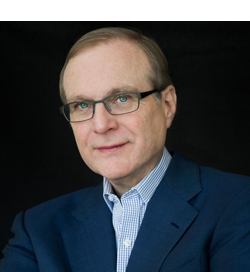| Paul Allen, Co-Founder of Microsoft, Dies |
| Written by Sue Gee | |||
| Tuesday, 16 October 2018 | |||
|
Paul Allen, who with Bill Gates brought BASIC to the world and founded Microsoft, has died at the age of 65. The news was shared in a tweet from Vulcan Inc, the company formed by Allen in 1986 to oversee his numerous philanthropic efforts and organizations: Vulcan issued a longer statement which included this timeline of his life which provides an outline of his many ventures and interests:
Bill Gates also issued a statement which included: "I am heartbroken by the passing of one of my oldest and dearest friends, Paul Allen. From our early days together at Lakeside School, through our partnership in the creation of Microsoft, to some of our joint philanthropic projects over the years, Paul was a true partner and dear friend. Personal computing would not have existed without him." Current Microsoft CEO, Satya Nadella paid his tribute with a post on LinkedIn: "Paul Allen's contributions to our company, our industry and to our community are indispensable. As co-founder of Microsoft, in his own quiet and persistent way, he created magical products, experiences and institutions, and in doing so, he changed the world. I have learned so much from him – his inquisitiveness, curiosity and push for high standards is something that will continue to inspire me and all of us at Microsoft." As detailed in various articles on this site, the path that led to Microsoft started when Paul Allen met Bill Gates in the computer room of the school they both attended, Lakeside School in Seattle. Here they started to make money from their hobby, being paid to debug the operating system of the local PDP-10 timeshare, to computerize the school timetabling. They went on to build a microprocessor based machine to work out traffic census data and offer a data-processing service to their local authorities and this led to their first company, Traf-o-data.
The event that was the real impetus to the formation of Microsoft in 1975 was the launch of the Altair 8800, announced to hobbyists when it featured on the cover of Popular Electronics magazine in early 1975. Quick to understand the potential of affordable hardware, Allen suggested to Gates that they work together to make a BASIC interpreter for it. When they contacted Ed Roberts, whose Albuquerque-based company Micro Instrumentation and Telemetry Systems (MITS) produced the Altair kits, they claimed to already have a version of BASIC, the language written by for the 8080 microprocessor and were ready to do business. The only part of the claim that was true was the part about being keen to do business. To produce the BASIC, Allen first had to write an 8080 simulator for the college PDP-10 while Gates coded the interpreter and tackle the difficult task of squeezing the language into 4KBytes with enough space left over to run a program. They also had to form a company. It was Paul Allen who came up with its name name - combining Micro(processor) and Soft(ware) but it was Bill Gates who was the senior partner - being designated President while Allen was Vice President. The product that established Microsoft was MS-DOS, which it contracted to supply for the IBM PC, and, in 1980, it was Allen who purchased the rights to "Quick and Dirty Operating System," or QDOS, from its developer Tim Paterson. Microsoft rebranded QDOS as MS-DOS and, at the same time as supplying it to IBM, reserved rights to it for Microsoft. In 1983, Allen stepped aside from day-to-day operations at Microsoft, although he remained on the company's board of directors until 2000. His relationship with Bill Gates and Steve Ballmer was, as he revealed in his 2011 autobiography "Idea Man" a source of tension and resentment, see Paul Allen on Bill Gates which includes footage from a televised interview marking the book's publication. As a philanthropist, Allen deployed the fortune he made from Microsoft over a wide range of endeavors, including the Allen Institute, founded in 2003 with the initial pursuit of understanding the brain, and since expanded into three divisions - the Allen Institute for Brain Science, the Allen Institute for Cell Science, and The Paul G. Allen Frontiers Group - dedicated to bio-science research. This was followed in 2013 with the Allen Institute for Artificial Intelligence, AI2, with the slogan "AI for the Common Good" and a mission to: contribute to humanity through high-impact AI research and engineering. This work will continue, as is made apparent by Vulcan CEO Bill Hilf, who as well as mourning the loss of Paul Allen notes in his statement that his company will work on furthering his mission.
|
Interact With DuckDB Using Local UI 01/04/2025 MotherDuck, DuckDB's makers, having listened to its users, has |
Tools To Share Your Codebase With LLMs 25/03/2025 Here we take a look at Gitingest and Repomix, two tools that render a codebase suitable for LLM ingestion. Why is that useful? |
More News
|
Comments
or email your comment to: comments@i-programmer.info
<ASIN:1591843820>





